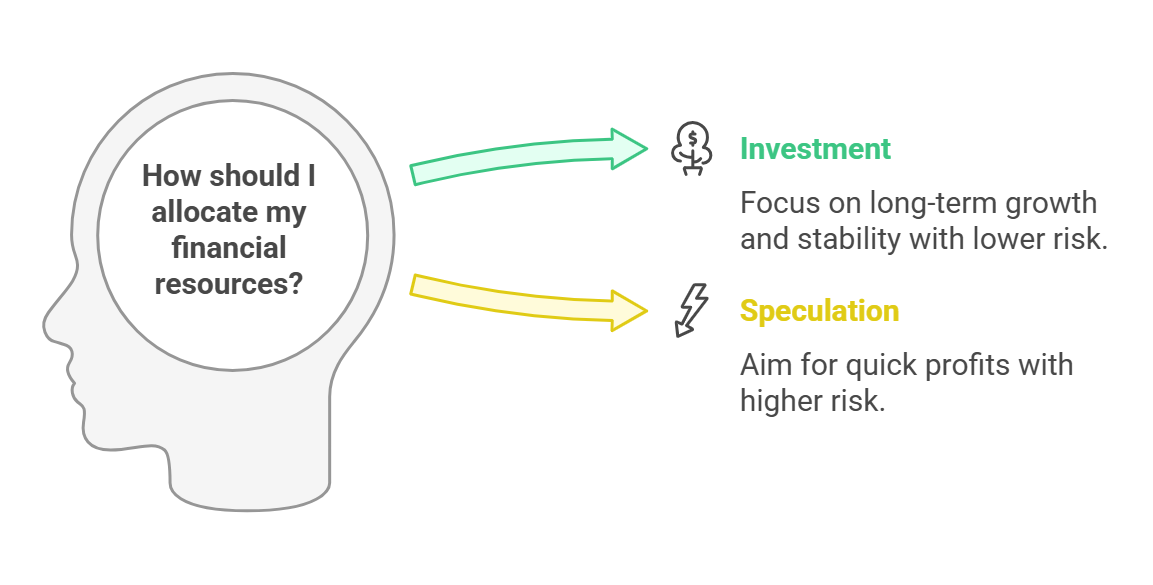Investment vs. Speculation
Understanding the Divide
While both investment and speculation involve committing resources with the hope of future gains, they differ significantly in their approach, risk profile, and time horizon.
Investment:
- Time Horizon: Long-term. Investors typically hold assets for months, years, or even decades. The goal is sustained growth over the long haul.
-
Analysis: Primarily based on fundamental analysis. This involves a deep dive into the underlying value of an asset, considering:
- Economic conditions
- Industry trends
- Company financials (earnings, revenues, debt, etc.)
- Management quality
- Competitive landscape
- Risk Profile: Lower to moderate risk. Investors carefully assess risk and seek a balance between risk and return. They prioritize preserving capital and achieving consistent growth.
- Goal: Wealth creation through the steady appreciation of assets and generation of income (dividends, interest).
Speculation:
- Time Horizon: Short-term. Speculators aim to profit from rapid price movements within days, weeks, or at most, a few months.
-
Analysis: Heavily reliant on technical analysis and market sentiment. Factors considered include:
- Chart patterns
- Trading volume
- Market psychology
- News and rumors
- Risk Profile: High risk. Speculators are willing to take on substantial risk in pursuit of quick and significant gains.
- Goal: To profit from short-term market fluctuations and capitalize on short-lived opportunities.
Key Differences Summarized:
| Feature | Investment | Speculation |
|---|---|---|
| Time Horizon | Long-term | Short-term |
| Analysis Basis | Fundamental analysis (intrinsic value) | Technical analysis (market sentiment) |
| Risk Profile | Lower to moderate | High |
| Goal | Wealth creation & steady appreciation | Quick profit from market fluctuations |
Elaboration on Key Aspects:
-
Fundamental vs. Technical Analysis: The contrast in analytical methods highlights the core difference. Investors aim to understand the intrinsic value of an asset, believing that the market will eventually recognize this value. Speculators focus on predicting price movements, regardless of whether the price reflects the underlying value.
-
Risk Tolerance: Investors are typically risk-averse, seeking investments that offer a reasonable probability of success. Speculators are more risk-tolerant, willing to accept greater risk for the potential of outsized returns.
-
Example (from the book): The difference between the college professor who invests in Reliance stock for long-term dividends and the friend who invests in Fraternity Electronics based on rumors.
Important Considerations:
- Blurring the Lines: It's important to note that the distinction between investment and speculation is not always clear-cut. The same asset can be used for investment or speculation depending on the individual's motive and time horizon.
- Informed vs. Uninformed: All investment and speculation strategies are informed by data. In general, with speculation, the data comes in the form of charts and the "expert" opinions of various traders. In investing, the data is in the financial statements of a company, an economic forecast, or the condition of a market.
- Sophistication: Investment and speculation can both involve sophistication in determining the value of an asset to own. This means that data-driven sophistication is not what differentiates an investment from a speculation.
-
The Illusion of Expertise: Many investors are simply speculators who claim they are investors. An investor will study a company and conclude, that no matter how they work, its products will never be highly desired on a mass market, so they claim investing in the company’s stock would never be a wise choice. But in fact, data of this kind should encourage you to consider short-term price trends. If you can be almost sure the company’s stock value is about to decline, what is a speculation? The answer is a carefully informed short.
Investment
 In Conclusion:
In Conclusion:
While both investment and speculation can play a role in wealth management, it's crucial to understand the difference and to align strategies with your own risk tolerance and financial goals. Wealth management generally leans towards investment strategies focused on long-term value and managed risk.

No Comments